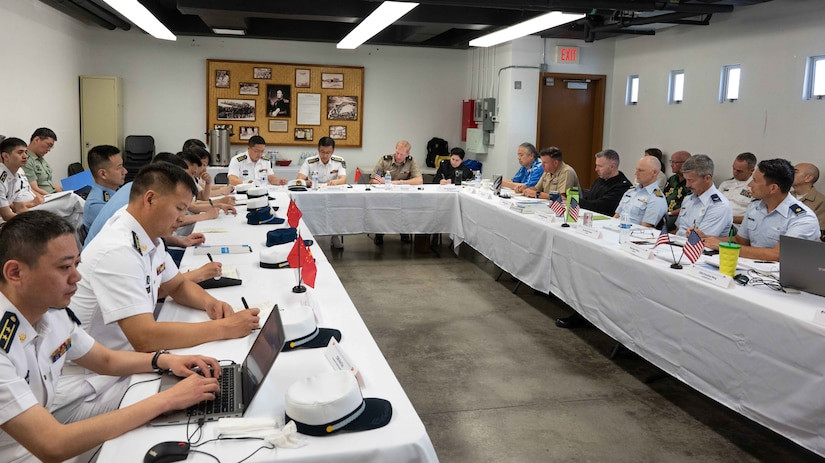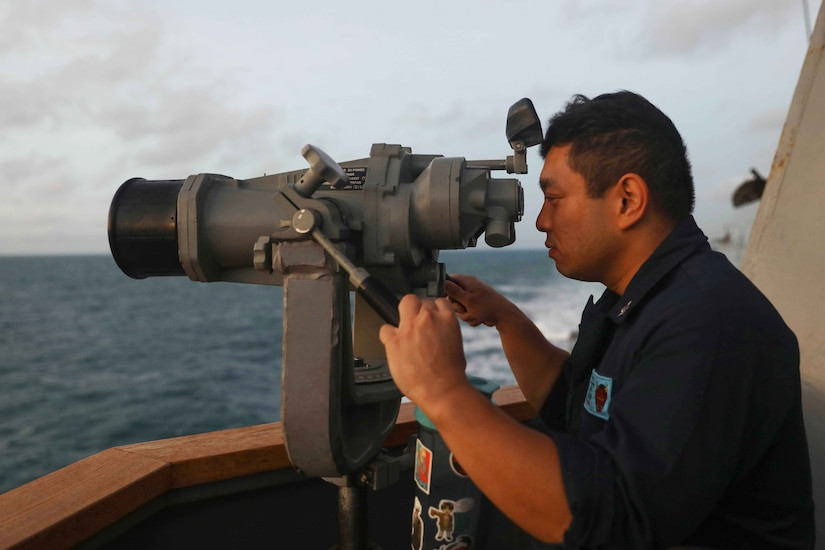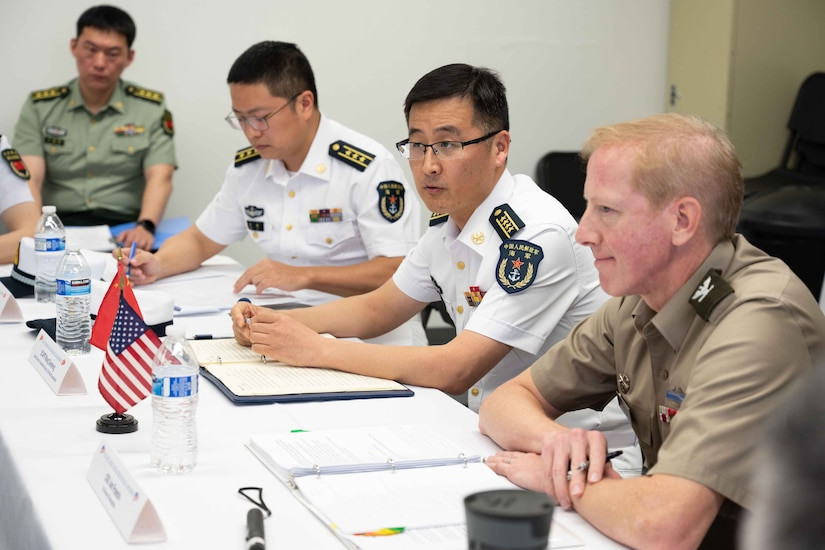Military officials from the United States and China convened this week in Honolulu for working-level discussions. The focus of these talks was to ensure safe and professional interactions between their air and naval forces.
 Members of the U.S. and Chinese military meet around a large table.
Members of the U.S. and Chinese military meet around a large table.
Working Group. Military representatives from U.S. Indo-Pacific Command, U.S. Pacific Fleet, and U.S. Pacific Air Forces met with their Chinese counterparts for the Military Maritime Consultative Agreement Working Group in Honolulu on April 3, 2024.
These two-day discussions marked the recommencement of the Military Maritime Consultative Agreement Working Group (MMCA), a series of annual operational safety dialogues established over two decades ago. The MMCA dialogues had been paused, with the last meeting held in December 2021.
Representatives from U.S. Indo-Pacific Command, U.S. Pacific Fleet, and U.S. Pacific Air Forces engaged with counterparts from China’s People’s Liberation Army during this year’s MMCA.
Colonel Ian Francis, the U.S. Indo-Pacom’s director of Northeast Asia policy and head of the U.S. delegation, expressed encouragement at the participation of China’s army representatives. He conveyed his anticipation for future discussions aimed at ensuring the safety of forces operating in the region.
“The Military Maritime Consultative Agreement serves as U.S. Indo-Pacom’s primary channel for direct communication with the PLA regarding air and maritime operational safety,” Colonel Francis stated. “The United States remains committed to operating safely and professionally within the Indo-Pacific region, wherever international law permits, and we take this responsibility with utmost seriousness.”
He emphasized, “Open, direct, and clear communication with the PLA, as well as with all other military forces in the region, is crucial to prevent accidents and miscommunication.”
During this year’s MMCA, officials from both nations reviewed specific safety-related incidents that have occurred in the region in recent years. They also engaged in discussions on maintaining maritime and aviation operational safety and professionalism.
 A service member in uniform looks through binoculars aboard a Navy vessel.
A service member in uniform looks through binoculars aboard a Navy vessel.
Standing Watch. Navy Petty Officer 3rd Class John Valor stands watch on the bridge of the USS Rafael Peralta during transit through the Taiwan Strait on November 2, 2023.
President Joe Biden secured China’s agreement to resume military-to-military talks during a meeting with Chinese President Xi Jinping at the Asia-Pacific Economic Cooperation forum in Woodside, California, in November.
This meeting was promptly followed by discussions between Chairman of the Joint Chiefs of Staff Air Force Gen. CQ Brown, Jr., and his People’s Liberation Army counterpart, Gen. Liu Zhenli, in December.
In January, senior military officials from both the U.S. and China resumed the U.S.-China Defense Policy Coordination Talks at the Pentagon. These high-level talks had been on hold since September 2021.
According to the most recent China Military Power Report, the U.S. has documented over 180 instances of coercive and risky air intercepts against U.S. aircraft in the region between 2021 and 2023.
The report indicates that the past two years have seen more risky intercepts than the entire preceding decade.
In previews of this week’s military-to-military talks, defense officials noted a decrease in China’s unsafe behavior towards U.S. maritime and air operators in the region.
A senior military official commented, “We’ve observed a reduction in unsafe behavior between PLA aircraft and vessels and our own over the last several months. We are encouraged by this and appreciate the opportunity presented by the MMCA to discuss ways to ensure this positive trend continues.”
Military Meeting. Military representatives from U.S. Indo-Pacific Command, U.S. Pacific Fleet, and U.S. Pacific Air Forces engage in discussions with China’s military representatives for the Military Maritime Consultative Agreement Working Group in Honolulu on April 3, 2024.
However, U.S. officials expressed ongoing concerns regarding China’s continued unsafe actions towards non-U.S. maritime operations in the region.
“In recent months, we have observed the PRC continuing to act dangerously and unlawfully against routine maritime operations conducted by the Philippines in the South China Sea,” a senior defense official stated. “We will continue to press [China] on these matters.”
President Biden and President Xi held another phone discussion this week, engaging in a “candid and constructive discussion on a range of bilateral, regional, and global issues, including areas of cooperation and areas of difference,” according to a White House summary of the call.
During their discussion, Biden underscored the importance of maintaining peace and stability across the Taiwan Strait. He also raised concerns about China’s support for Russia’s defense industrial base.
Both leaders “welcomed ongoing efforts to maintain open channels of communication and responsibly manage the relationship” through diplomatic channels and working-level dialogue, as stated in the summary of their conversation.
Spotlight: Focus on Indo-Pacific Spotlight: Focus on Indo-Pacific: https://www.defense.gov/Spotlights/Focus-on-Indo-Pacific/

 Service members in U.S. and foreign military uniforms sit at table displaying U.S. and Chinese flags.
Service members in U.S. and foreign military uniforms sit at table displaying U.S. and Chinese flags.